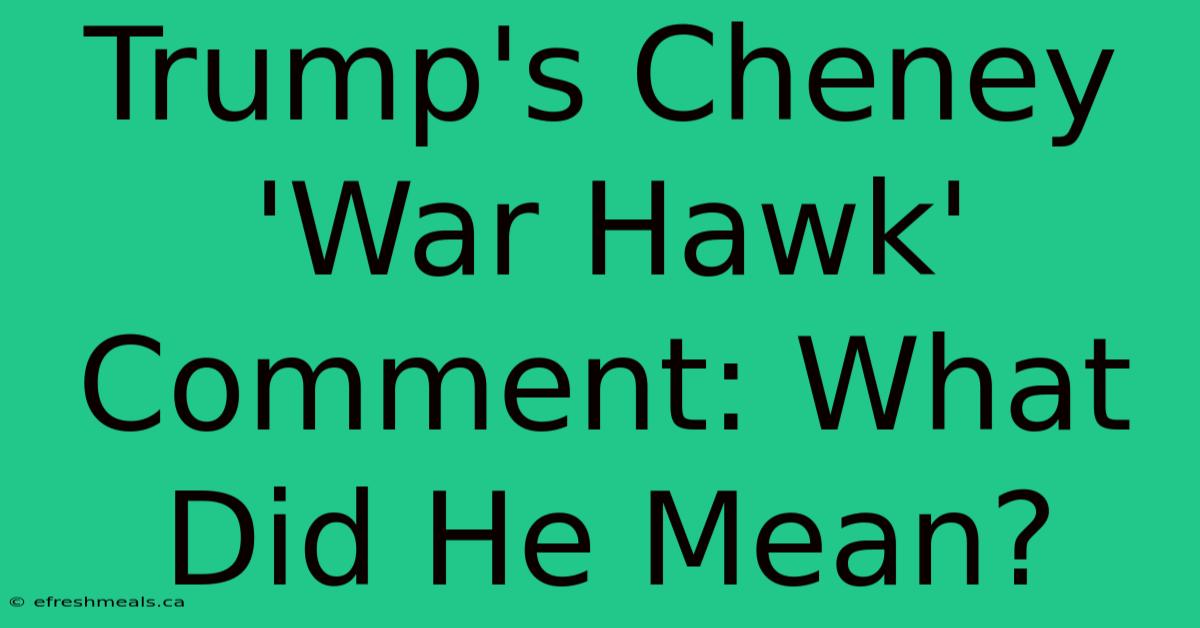Trump's Cheney 'War Hawk' Comment: What Did He Mean?

Discover more detailed and exciting information on our website. Click the link below to start your adventure: Visit Best Website nimila.me. Don't miss out!
Table of Contents
Trump's Cheney 'War Hawk' Comment: What Did He Mean?
Have you ever wondered what former President Trump meant by calling Liz Cheney a "war hawk?" This article delves into the implications of this label and its impact on the political landscape.
Why It Matters: The term "war hawk" is a loaded one, often used to criticize individuals perceived as overly eager to engage in military conflict. Understanding the context of Trump's comment is crucial for analyzing the evolving dynamics of American politics.
Key Takeaways of "War Hawk":
| Keyword | Definition | Significance in Context |
|---|---|---|
| War Hawk | Someone who advocates for aggressive foreign policy, often involving military intervention | A label often used to criticize individuals perceived as being too quick to resort to war |
| Foreign Policy | A government's approach to dealing with other nations | Trump's comment reflects his criticism of Cheney's hawkish approach to foreign policy |
| Military Intervention | The use of military force by one country to influence the affairs of another | Cheney's past support for military interventions, particularly in Iraq, is a key aspect of this debate |
Trump's Cheney 'War Hawk' Comment: A Deeper Dive
War Hawk: A Loaded Term
The term "war hawk" often carries strong connotations of aggressive militarism, a tendency to prioritize military solutions over diplomatic ones. It's a label that can be used to discredit individuals and their foreign policy stances, particularly in times of peace or when public opinion leans toward diplomacy.
Liz Cheney's Foreign Policy Stance
Liz Cheney, daughter of former Vice President Dick Cheney, has long been associated with a hawkish foreign policy. Her stance is rooted in her family's history of involvement in foreign affairs, particularly her father's role in the "War on Terror" and the 2003 invasion of Iraq. Cheney has consistently advocated for a strong military presence globally and has been critical of President Biden's withdrawal from Afghanistan.
Trump's Criticism
Trump's characterization of Cheney as a "war hawk" can be seen as a continuation of his broader criticism of neoconservative foreign policy. Trump has repeatedly advocated for a more isolationist approach, prioritizing American interests above global interventionism. His comment reflects a fundamental disagreement with Cheney's views on the role of the US in international affairs.
The Implications
Trump's comment underscores the deep ideological divisions within the Republican Party, particularly on the issue of foreign policy. While Cheney represents a more hawkish faction, Trump's rhetoric highlights a growing trend towards isolationism and skepticism of interventionism within the party.
Beyond Cheney: The Broader Context
The debate around "war hawks" extends beyond individual personalities and reflects a broader discussion on the proper role of the US in the world. This debate touches on issues such as:
- The balance between national security and international responsibility: To what extent should the US prioritize its own interests over global security and stability?
- The effectiveness of military intervention: Are military solutions always the best option for resolving international conflicts?
- The cost of military action: Should the US be willing to commit resources and manpower to foreign interventions, even at significant cost?
FAQ
Q: What is the difference between a "war hawk" and a "dove?" A: While "war hawk" suggests an eagerness for military action, a "dove" represents a more pacifist and diplomatic approach to foreign policy.
Q: Why is the term "war hawk" controversial? A: The term is often used as a derogatory label, implying that those labeled "war hawks" prioritize militarism over diplomacy and potentially lack empathy for the consequences of war.
Q: Is Liz Cheney the only Republican considered a "war hawk?" A: While Cheney is a prominent figure, there are other Republicans who advocate for a more aggressive foreign policy stance, particularly those who support increased military spending and interventionism.
Q: Is Trump's criticism of Cheney solely focused on foreign policy? A: Trump's criticism extends beyond foreign policy and includes a range of issues, including Cheney's role in the January 6th Committee investigating the Capitol riot, which he sees as a political attack.
Tips for Understanding "War Hawk" Politics
- Read beyond headlines: Focus on in-depth analysis to understand the nuances of foreign policy debates.
- Consider multiple perspectives: Explore diverse viewpoints to gain a comprehensive understanding of the issues.
- Research historical context: Understanding past events and foreign policy decisions can provide valuable insights.
- Be critical of language: Recognize how terms like "war hawk" can be used to manipulate public opinion.
Summary
Trump's comment regarding Liz Cheney as a "war hawk" reflects a broader ideological divide within the Republican Party concerning foreign policy. It highlights the ongoing debate about the US's role in the world, the effectiveness of military intervention, and the balance between national security and international responsibility. Understanding the complexities of this debate requires engaging with diverse viewpoints, researching historical context, and remaining critical of loaded language.
Closing Message: As the debate on US foreign policy continues, it's important to engage in respectful dialogue, consider multiple perspectives, and strive for a deeper understanding of the complex challenges facing the world today.

Thank you for visiting our website wich cover about Trump's Cheney 'War Hawk' Comment: What Did He Mean? . We hope the information provided has been useful to you. Feel free to contact us if you have any questions or need further assistance. See you next time and dont miss to bookmark.
Featured Posts
-
Um News Us Methodist Voting Patterns
Nov 02, 2024
-
Trump Stands By Cheney War Hawk Label
Nov 02, 2024
-
Local Grocer Aids Dia De Los Muertos Celebration
Nov 02, 2024
-
Shooting At Orlando Halloween Event 2 Fatalities 6 Injured
Nov 02, 2024
-
Halloween Night Shooting In Orlando 2 Fatalities
Nov 02, 2024
